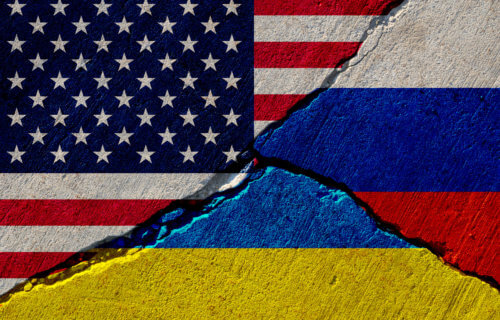VIENNA, Austria — Sanctions on Russia don’t just affect Vladimir Putin’s country — they have a ripple effect throughout the world. With many Western nations ramping up the penalties for Russia’s invasion of Ukraine, a team at the Complexity Science Hub Vienna examined how economic sanctions play out on the world stage. Their findings reveal that not only will the Russian economy shrink under growing international pressure, there’s also a chance the United States can benefit from cutting ties to Russia in the long-term.
Overall, researchers found that the current wave of sanctions targeting Russian businesses and individuals will cause the country’s economy to shrink by six percent. According to the team’s economic models, however, that number would balloon to 17 percent if China and India impose these same sanctions.
“We use a combination of economic models that allow us to estimate supply and demand shocks of many economies simultaneously,” explains study senior author and CSH President Stefan Thurner in a media release. “Our extension to classical input-output analysis shows the shock waves started in one place running through the world’s economies and give us a feeling of how strong they play out in a global context.”
“We find that a far-reaching embargo will affect Russia far more than other countries,” reports first author Tobias Reisch. “With the current sanctions, the Russian economy will decline by 6 percent, if India and China follow, the decline will be 17 percent, according to our calculations.”
Cutting off oil and gas is the key
With the United States recently stepping up to ban Russian oil imports, the researchers examined how a worldwide embargo on Russian energy would impact global economies.
Estimates show a global oil and gas embargo would deal another crippling blow to the Russians as they look to fund their war effort. If Western countries add an energy embargo to their sanctions, researchers say the Russia economy will shrink by another 12.4 percent.
Study authors used data from the Organization for Economic Co-operation and Development (OECD) on 66 countries and 45 industries to reach their conclusions. Their first model, looking at the impact of current sanctions, found that Russia’s motor vehicle industry will suffer the most — dropping off by 52 percent.
Production of electrical equipment (–39%), machinery (–36%), manufacturing of other transport equipment (–34%), and computer, electronic, and optical equipment (–33%) will also suffer under the weight of these international penalties.
At the same time, Reisch found that European nations would only feel a minor price shock from the drop-off in Russian goods.
“However, there will be supply chain disruptions that we can presently not model and that could cause much more severe damage,” the researcher warns.
The U.S. should say ‘drill, baby, drill’
In the second model, examining a potential global Russian energy embargo, researchers found such a move could end up benefiting several countries that have their own energy sitting underground. The models show Australia, Norway, Saudi Arabia, and the U.S. all stand to profit the most from a worldwide oil ban on Russia.
Specifically, oil and gas extraction sectors in Saudi Arabia would increase their output by 6.9 percent. Meanwhile, the same industries in America (+6.7%) and China (+6.4%) could also increase their output by similar amounts.
The findings are published in CSH policy brief “Shocking Russia | How will economic sanctions affect the Russian economy, how will an oil and gas embargo play out, and how are sanction-imposing countries affected on the various industry sectors?”

